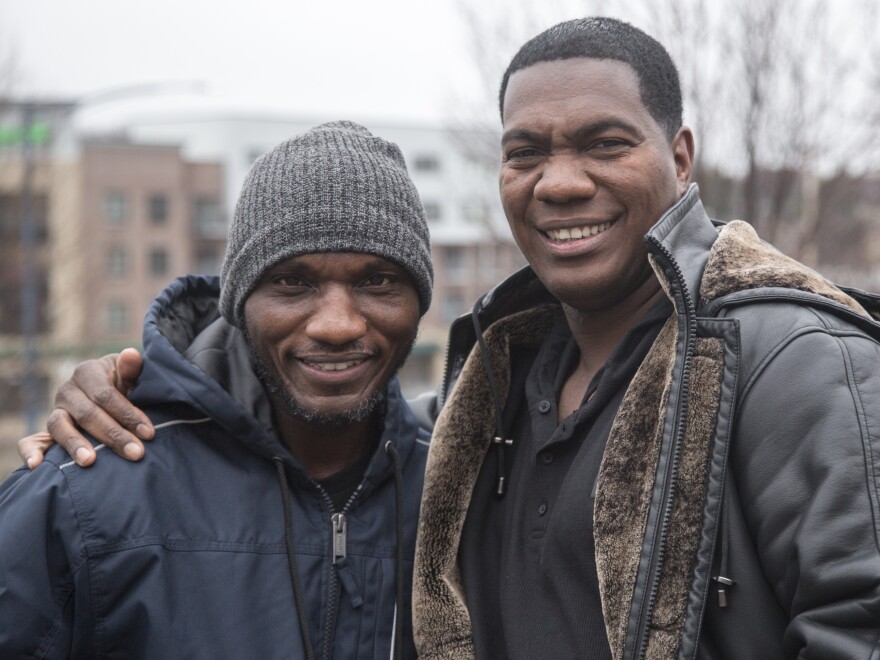Growing up poor in Mississippi, Cedric Burnside didn't have running water.
It's a fact he highlights in the first song on his Grammy-nominated album, Benton County Relic.
In the upbeat, soulful song, titled "We Made It," Burnside croons verses like, "I came from nothing, I done been lower than low" and "Walk 3 miles every day, to have water in the house for another day."
Burnside grew up in his grandfather's house, along with many of his cousins. It wasn't until he was 12 years old that they finally got running water.
"When you don't have running water and you finally move in a place that has running water ... y'done made it," he said, speaking to the title of his first song.
It's no surprise that Burnside's album was nominated for a Grammy this year in the Best Traditional Blues category, considering his family roots. He is the grandson of the late R. L. Burnside, who was among a group of musicians known for a style called North Mississippi hill country blues.
R.L., who Burnside calls "Big Daddy," was the person who helped him get his start in music. At the age of 13, Burnside started playing drums in juke joints with his grandfather and the two went on to tour extensively together.
The influence of his grandfather is featured in his song "Ain't Gonna Take No Mess From You," where Burnside sings "My school was a juke joint from a kid till I was grown, and blues is really all I've never known."
Burnside, now 40, pays tribute to his grandfather in other ways as well. Stepping up to the microphone for a performance in Des Moines, Iowa he said, "This is a song I used to hear my "Big Daddy" play all the time."
Then, just like his grandfather used to, Burnside started plucking the strings on his guitar to kick off the song, "Just Like A Woman."
"There was Adam had to make a bee, that eve had to messin' that old apple tree," he sang to the backdrop of a stuttering notes. "Just like a woman ... just like a woman they'll do it every time."
This is a style that strips the music to the bone, according to Greg Johnson, a blues curator at the University of Mississippi.
"The emphasis is really on the rhythmic drive of the piece," Johnson said. "You get a little riff going, a little groove going in the guitar. A lot of times you won't change to another chord."

Burnside prefers to call the unorthodox style, "feel music." It's what his grandfather used to play on the weekends, after working as a sharecropper during the day.
In the documentary "You See Me Laughin': The Last of the Hill Country Bluesmen," R.L. spoke about his own humble origins and said, "We'd play, man, from 8 o'clock till 3 or 4 o'clock in the morning. Probably get 3 dollars."
Everything changed when R.L. was signed to Fat Possum Records in the 1990s and started playing in rock clubs across the country. Some of R.L.'s music was featured in the Sopranos, helping the music reach an even wider audience.
Despite the success, R.L. never moved out of his rural home. Instead, he opened his home up for more family members to stay.
"He would give you the shirt off his back. I mean literally," Burnside said. "But he always kept that .38 in his left pocket. Know what I'm saying? He never took that out."
Burnside's career was inspired by his grandfather's attitude toward success. Now, he in turn inspires his older cousin, Kent Burnside, who is also a blues musician and who grew up in the same house as Burnside.
"I'm like, he did it," Kent said. "I just gotta find a different way of doing it because everybody's method ain't the same, y'know what I'm sayin'? But I knew it was possible."
Burnside wants to be known as more than R.L. Burnside's grandson, but still wants to pay tribute to his grandfather, who died in 2005.
"Before I leave this world I want to make my mark," Burnside said. "That's what I'm trying to do right, but as I do that, I want to not forget where I come from and where I learned it from, which is R.L. Burnside."
Copyright 2024 Iowa Public Radio News




